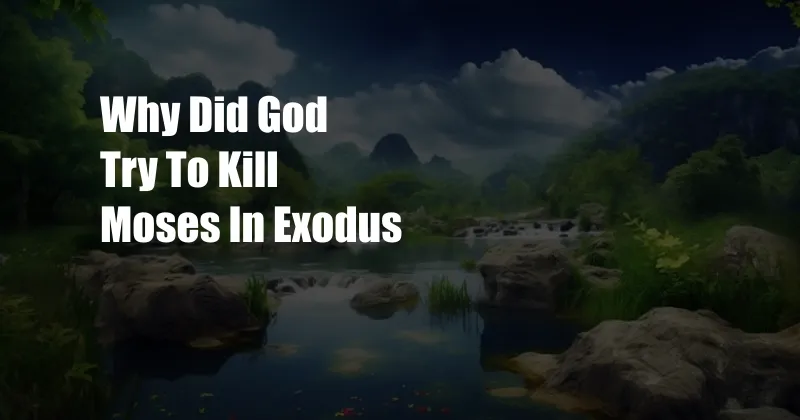
**Why Did God Try to Kill Moses in Exodus?**
As I flicked through the pages of Exodus, my eyes stumbled upon a perplexing verse that made me pause and re-examine my understanding of God’s character. In Exodus 4:24, it states, “And it came to pass by the way in the inn, that the Lord met him, and sought to kill him.” This incident sparked a whirlwind of questions within me, prompting me to delve deeper into the context and meaning behind God’s actions.
To unravel this enigmatic event, we must embark on a journey back to the heart of the Exodus narrative. Moses, a reluctant leader, had been summoned by God to lead the Israelites out of slavery in Egypt. Despite his protests and doubts, Moses obeyed the divine call and returned to Egypt to confront Pharaoh.
**Moses’ Circumcision and Its Consequences**
Before Moses could embark on his mission, he faced a significant challenge that set the stage for the events in Exodus 4:24. Zipporah, Moses’ wife, had not circumcised their son. Circumcision was a crucial covenant sign between God and the Israelites, and its neglect carried grave consequences. As Moses and his family traveled, God appeared to him and expressed his anger over the uncircumcised son. According to Jewish tradition, Zipporah quickly circumcised her son with a sharp stone, appeasing God’s wrath and averting disaster.
**The Mystery of Exodus 4:24**
In the aftermath of the circumcision, the narrative takes a perplexing turn. As Moses and his family continued their journey, God encountered them at an inn and “sought to kill him.” The suddenness and severity of God’s reaction have puzzled scholars and theologians for centuries. Some interpret this verse metaphorically, suggesting that God sought to kill Moses’ sinful nature or challenge his faith. Others believe that God’s anger was directed at Zipporah, who had initially resisted circumcising her son.
However, a closer examination of the Hebrew text reveals a fascinating nuance. The word used for “kill” in this verse is “bikkēš,” which implies seeking or pursuing rather than an outright attempt to slay. It suggests that God’s intention was not to end Moses’ life but to confront him and address the unresolved issue of circumcision. By understanding the cultural and religious significance of circumcision, we gain a deeper appreciation of the weight and urgency of this matter in the eyes of God.
**God’s Conditional Mercy and Restoration**
God’s actions in Exodus 4:24 highlight the conditional nature of his mercy and the importance of obedience to his covenant. While God had chosen Moses to lead the Israelites, his favor was not unconditional. Moses’ neglect of circumcision, a sacred sign of the covenant, had consequences. The incident served as a wake-up call, reminding Moses and the Israelites of the importance of adhering to God’s commands. However, it also revealed God’s willingness to forgive and restore those who repent and return to obedience.
**Lessons for Our Lives**
The story of Exodus 4:24 offers valuable lessons for our lives today. First, it reminds us of the importance of obedience to God’s commands. While God’s love and mercy are boundless, they are not unconditional. Our faithfulness and obedience to his will are essential for experiencing his blessings and protection. Secondly, it teaches us that God’s anger is not capricious but is often a response to our disobedience or neglect. When we stray from his ways, we risk experiencing the consequences of his displeasure.
However, the story also offers hope and assurance. God’s conditional mercy means that even when we fail, we can repent and seek his forgiveness. He is a God of second chances, willing to restore and bless those who turn back to him in humility and obedience. By understanding the lessons of Exodus 4:24, we can deepen our understanding of God’s character and our own responsibilities as his followers.
**FAQ**
Q: Why did God seek to kill Moses in Exodus 4:24?
A: Because Moses had not circumcised his son, violating a sacred covenant with God.
Q: What is the significance of circumcision in the Exodus narrative?
A: Circumcision was a sign of the covenant between God and the Israelites, symbolizing their commitment to obey his commands.
Q: How did the circumcision of Moses’ son appease God’s wrath?
A: It demonstrated Moses’ obedience to God’s covenant and restored their relationship.
**Conclusion**
The incident in Exodus 4:24, where God “sought to kill” Moses, is a complex and multifaceted event that sheds light on God’s conditional mercy, the importance of obedience, and the power of repentance. By understanding the cultural and religious context, we gain a deeper appreciation for the weight and significance of this narrative. As we reflect on the lessons of Exodus 4:24, may we be reminded of the importance of faithfulness to God and the hope we have in his forgiveness when we fall short.
Are you interested in learning more about the Exodus narrative and its relevance to our lives today? Share your thoughts and questions in the comments below, and let’s continue the conversation.